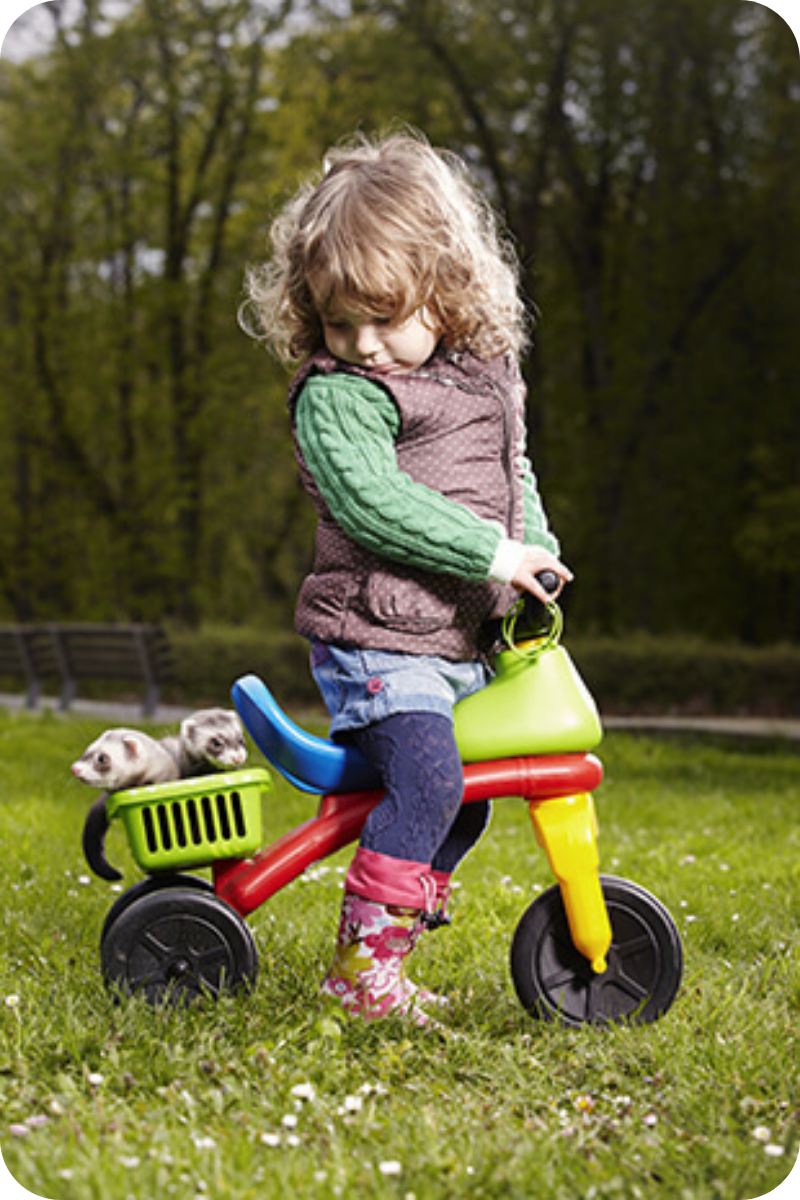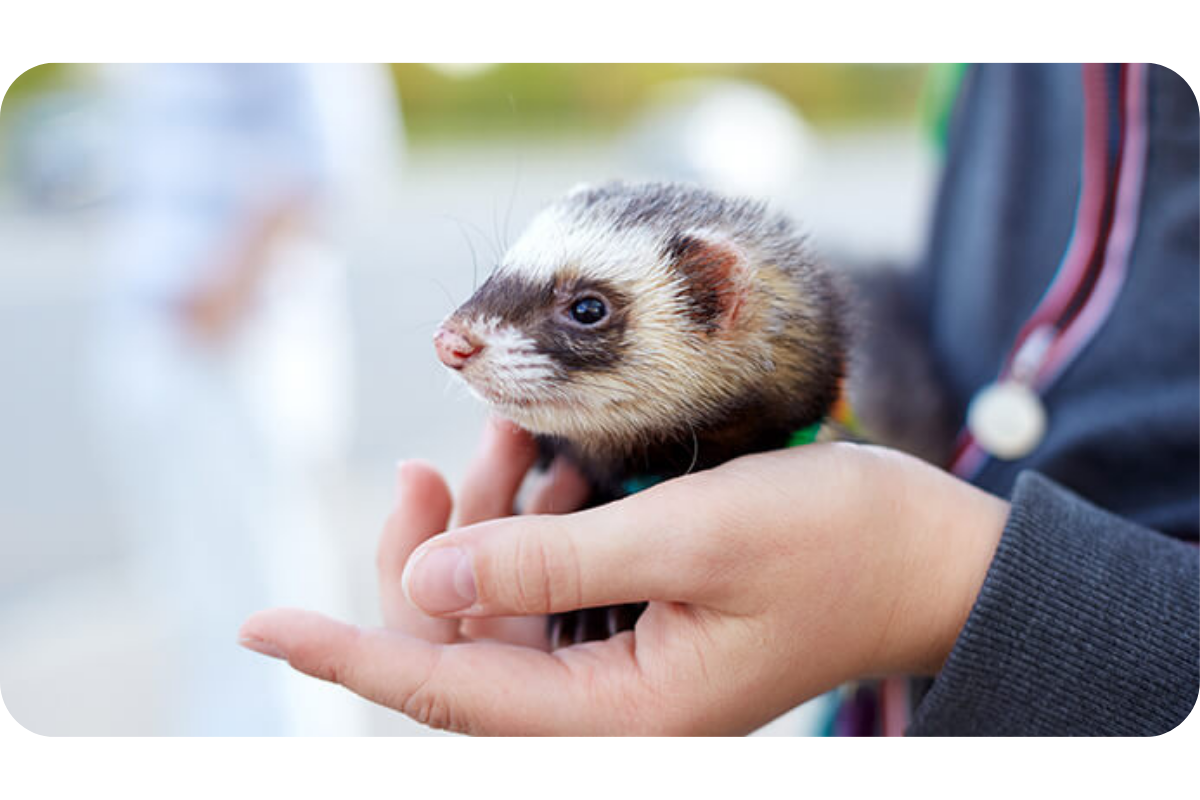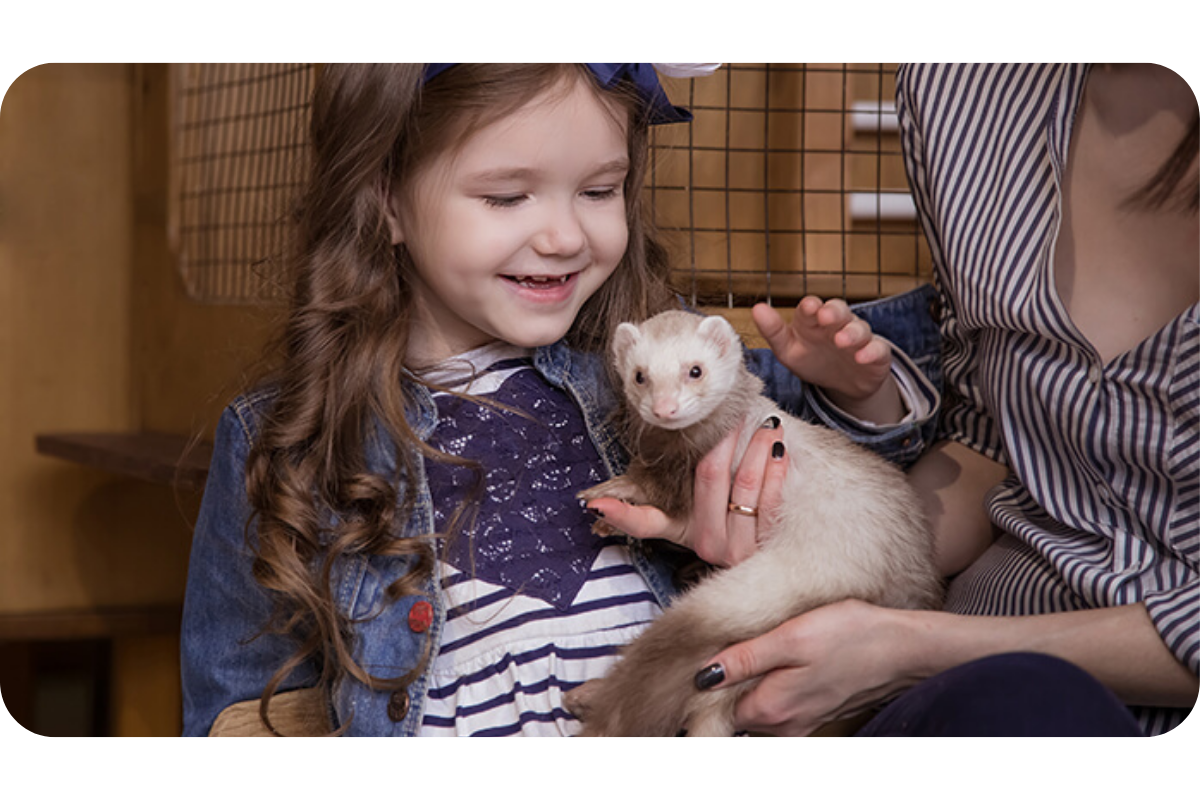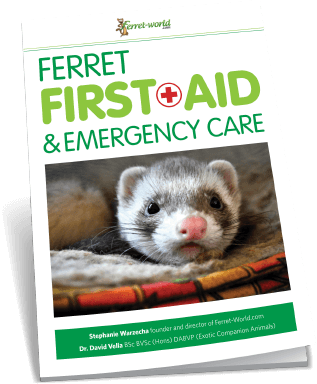
Safety is key
The number one issue when it comes to ferrets and children is safety. Because ferrets are so small and playful, it’s important to supervise ferrets and children closely. It’s best to allow an older, well-trained ferret to interact with one child at a time because younger kits are prone to biting (and therefore unsafe for children to handle). All ferrets need to be treated delicately because they can be injured by rough handling.

Helping Your Ferrets Live Healthier, Happier Lives
Join other ferret owners and experts and get access to Dook Dook Ferret Magazine, Ferret-World Members Community and other Resources!
Common mishaps with ferrets
Accidentally stepping on a ferret. Adults and children can easily step on a ferret and crush her spine, resulting in paralysis or even death.
Being bitten. If a ferret is stressed, he may bite the person who is holding him.
Children especially need to be careful not to yank or squeal at a ferret or hold the ferret in an insecure position. (To hold a ferret securely, place one hand around and underneath her belly and use the other hand to support the hind legs. Hold the ferret against your body to help her feel snug and safe.)

Things to consider before bringing a ferret into your family home
- Do you have the time to supervise a ferret? Ideally, ferrets need four hours or more of time outside of their cage, and they need to be supervised because of their ability to get into trouble while roaming around the house.
- Are you willing to invest time and money into “ferret-proofing” your home? Ferrets will squeeze themselves into dangerous spaces, steal your belongings, and chew on household objects. To make your home safe for a ferret, you’ll have to spend time modifying your space to remove tempting but dangerous things.
- Are you willing to train a ferret? Younger ferrets or rescue ferrets may need to be trained not to bite and to use litter boxes.
- Are you able to afford a ferret’s vet care? Ferrets often develop chronic diseases that require a vet’s care.
Do ferrets eat human babies?
There are some terrifying stories in the news about ferrets attacking babies. To our knowledge, these incidents have occurred when the ferret is neglected and/or abused and the baby is not being supervised. These attacks are not common. Ferrets and children can live peacefully in the same house. To keep everyone safe, make sure your ferret is safely secured in his cage when he is not being supervised. Always supervise interactions between ferrets and children.


How to introduce your ferret to your children
There are ways for you to facilitate a safe and loving relationship between your ferret and your children. Here we’ll discuss ways how older children (age six and older) can love and bond with a ferret. We’ll discuss younger children and ferrets below.
- Consider the temperament of ferret and child. If either is prone to aggressive behavior or is easily excitable, it is best not to let the child handle the ferret directly. If the ferret is known to be a biter, it’s especially important not to let children handle him or her.
- Don’t play rough with your ferret to encourage him to be gentle with humans.
- Let your ferret become familiar with your child’s smell by placing a used piece of bedding, like a small blanket, in the ferret’s cage.
- For the first few encounters between the ferret and the child, consider holding your ferret. Encourage your child to pet the ferret, move slowly, and use a soft, calm voice with her.
- One way to help a child with gentle petting is to instruct her to use two fingers, index and middle, to pet the ferret. That way, the child will be less likely to grab unintentionally. Another idea is to teach the child to use her pinkie finger as a “petting finger.” Have the child make a fist, then extend just the pinkie for petting the ferret.
- Always supervise children and ferrets together. Children don’t have the skills to supervise a ferret, so it’s up to you to supervise them both when they are together.
- If you do allow your child to hold the ferret, have the child sit down and hold the ferret such that her back legs are being supported. Let the child know that the ferret will want to sniff him a lot and that he shouldn’t be scared of this behavior. This is just the ferret getting to know a new human! In addition, depending on the ferret, you may want to caution your child that the ferret doesn’t always want to be cuddled and may want to be set free of human arms.
- Prevent your kids from playing in the ferrets’ litter boxes. Germs can be transmitted between ferrets and humans, and litter boxes are a particularly disgusting way to pass germs back and forth.
Baby ferrets (kits) should not interact with children
Baby ferrets (kits) are not a good match for children. Kits have a tendency to nip (bite); after all, nipping is a normal part of ferret play. Ferrets have thick skin, which means that nipping tends to cause little or no damage to other ferrets. Comparatively, humans have thinner, more delicate skin and are more likely to be hurt by a ferret’s playful nip.
As a ferret owner, it’s up to you to teach your kits not to nip. Until they learn to do so, it’s best to not allow them to interact with human children. Kids may be upset, frightened, or startled by an unexpected nip. Their reaction may cause them to move suddenly in a way that could injure a ferret. We don’t see a good reason to take this chance with your ferret or kids.


Can babies and ferrets play together?
Generally, it’s best not to allow babies and ferrets to interact, as it can be dangerous for both child and ferret. If you are at all concerned that your ferret may hurt your baby or vice versa, the safest thing is to not allow them to play together until you are able to teach your child how to behave around a ferret.
For experienced ferret owners who want to introduce a younger child to a ferret, consider taking the following precautions in addition to the advice above for older children.
- Teach your child to be gentle with the ferret. Remember that this process may take time, but your role as a parent and ferret owner is to facilitate a healthy relationship between your child and your ferret.
- Ensure your ferret’s safety by holding him securely during all interactions with young children. If you feel it’s safe, let the child pet the ferret gently.Refrain from having your ferret near a baby who is feeling fussy, as a baby’s cries may stress your ferret. In addition, it may be best to keep your ferret’s cage in a room that has some soundproofing so as to muffle any sounds from the baby.
- Be aware that ferrets love to steal items, so you may find some of your baby gear has disappeared! Many ferrets love chewy, rubbery objects, so they might go after baby bottle nipples and baby toys, these, if chewed and swallowed by the ferret, could also potentially cause an intestinal blockage that needs an operation to save the ferrets life. So make sure all your babies items are put away, out of reach of the ferret.
Make sure you have a parent’s permission
If a child other than your own wants to pet your ferret, be sure to obtain the parent’s permission. A parent or guardian is likely the person best suited to decide whether their child is capable of interacting well with an unknown animal. It’s best if you hold your ferret outside of the house to minimize the chance of your ferret escaping. Do not allow strangers to pet your ferret if the ferret is not up to date with her rabies vaccinations.
Nurturing the relationship between your children and ferret can be a beautiful, rewarding experience. Keep in mind safety and the needs of all involved to ensure that no one gets hurt.

